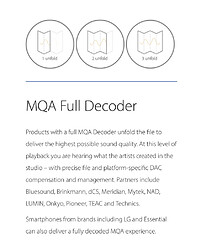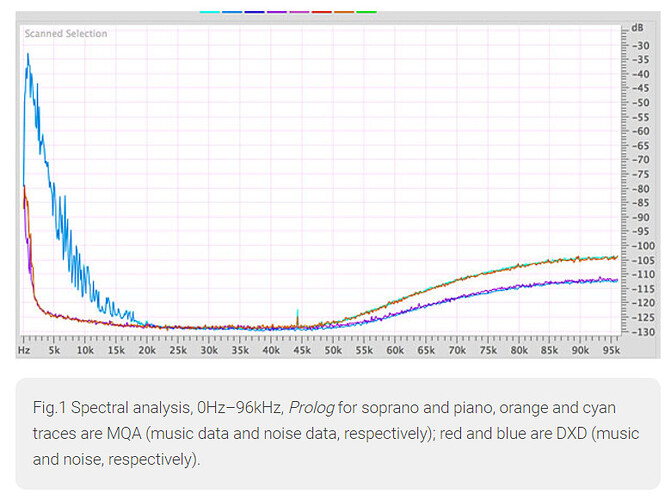Hi, I find the method using HQplayer interesting and DSD sounds good. MQA certification is not limited to the DAC chipset only though. 2nd and 3rd unfolds also sound better to my experience. Greetings
The problem is, the “deblurring” is technically impossible. With a couple of exceptions, most TIDAL “masters” of non-recent music just seem to have boosted bass, and in the case of what originated as reasonably high-quality recordings, have a lower level of detail than the original.
In the case of classical music especially, the subtle details that express the depth of the soundstage are destroyed and the music ruined.
Quite a few MQA-flagged 44.1/16 files on TIDAL have also been analysed, showing that they are bit-perfect identical to the non-MQA versions. This is clearly dishonest behaviour on TIDAL’s part.
The fewer “white glove” treated files seem to have been run through some kind of compression, enhancing the more subtle sounds, to make them sound clearer. However, doing this wouldn’t require the whole MQA system. I’m sure there’s a plug-in somewhere that does this to music which anyone could use.
The 2L recordings are interesting, as it is physically impossible for them to have more than one unfold. This can be clearly shown by doing a spectral analysis of the tracks, which show the high level of high-frequency noise from the ADC, which is clearly and simply filtered out by whatever process MQA uses. An analysis of the unfolded MQA shows that the high frequency noise has been removed.
That being said, any “unfold” beyond the first, is only up-sampling using a very short digital filter. I have seen absolutely zero proof of any actual digital origami beyond the first. Even the early diagrams from the MQA group suggested the requirement of a 32-bit digital file for beyond the first unfold, which would make the file gigantic, the complete opposite of the original intent.
And yet it’s done…
Your other observations on the sound are just that, personal observation and opinion. Never, of course, the result of the technically achieved, de blurring ![]()
MQA has never actually specifically said what deblurring is or does. It’s a marketing term, and has no actual recognized technical meaning.
Measurements of MQA show that it adds distortion and abnormalities to the audio stream-it doesn’t remove them.
If you like how it sounds, no problem. Just don’t promote falsehoods and Orwellian double speak.
Peter-
Please stop using the misleading term “third unfold”. There is no such thing. It’s a misdirection to try to make people think there’s some special third level off decompression to higher res going on. There isn’t.
MQA files are compressed. There is one unfold. Everything after that isn’t an unfold or decompression, it is simply upsampling via the MQA filters. Doing upusampling in two stages to higher rates doesn’t “unfold” anything and doesn’t create a non-existent “third unfold”. It’s upsampling.
I could care less, but I did some looking around… the third unfold is sourced from mqa uk…
I still like hqplayer’s DSD256 renderings better.
Of course it’s from MQA. All part of their misleading marketing of their product since day one.
MQA do in fact show the de blurring by demonstrating the almost elimination of pre and post ringing within the signal.
That’s what it does…
This is what it says it does, a “demonstration” is still wrapped up in patents and marketing obsfucation. Without open and clear documentation we’re left arguing over individual interpretations of MQA double speak. The best way to get my confidence would be publish the specifications and move the conversation out of the shadows.
They are not wrapped up in patents and marketing obfuscation. They are clearly explained in several white papers that have been cited here over and over. If you look at the published impulse responses of the filters, you will understand what is being said and what is meant by deblurring. However, ask yourself whether you would include that kind of signal processing in discussions on a consumer-oriented website like MQA’s blog, where 99.99% of consumers woud have no idea what you’re talking about.
Show me an end to end digital comparison of the data vs PCM, following a complete chain of MQAs DSP, all unfolds, however many we think there are now. That’s one of the few things I thought was clear 
Something I have saying for a long while but the marketing blurb is just blinding the truth
Well, you’re asking something that no algorithm designer would ever do. Just publish every detail, show measured end-to-end design data, and give the whole thing away free to competitors? The level of secrecy in most algorithms is far greater than with MQA.
“Unfolds” are their choice of wording to describe successive stages of signal processing. Since each is based on data included in the encoding and signal bits, it appears reasonable to name them successive unfolds. A lot of the internet argument calling ‘unfolds’ and ‘deblurring’ lying or deceptive marketing is more about just refusing to accept MQA’s choice of wording.
The evidence is in the Analog resolution compared to the Analog input. That’s where your comparisons should be made. All the digital stuff in the middle is not relevant. Then I hear many musicians who know the Analog input, it’s their creation (art) who say MQA delivers their intent. That’s makes me happy with the system, a system that works…
O yes it is…! , it’s not the first time a high-end audio company understand the problem on a higher level than others. 22 years ago HDCD was introduced and there are many similarities with MQA.
Both Keith O. Johnson and Bob Stuart understand the problem of digital filters and how to deal with it. The result is a serious and audible improvement.
Upsampling is part of unfolding, but you certainly need 3 folds and unfolds to reproduce a frequency spectrum up to 100 kHz in the analogue domain.
Ringing is known and understood technical term. “Blurring” isn’t. MQA is in no way necessary for removing ringing. There are many available filters that do it better than MQA.
Unlike you, MQA hasn’t claimed blurring=ringing- and they won’t: because if they do their whole argument falls apart.
MQA filters reduce ringing but introduce aliasing effects that don’t need to be there - because their filters are what is referred to as “leaky”. Technically inferior.
There are technically superior filters on the market that aren’t leaky and also remove ringing. None of them claim to “de-blur” - because it’s a made up term. MQA made it up to make it seem their process does something unique. It’s a lie.
Just another part of MQA deception that people like you insist on defending - with no actual basis in fact.
Lots more than 5, 18 + senses from what I have seen .
That’s your opinion, MQA took their system to market and are making a success of it. You could do the same if you wish.
The unique aspect of MQA is that it makes ALL other filters obselete when you play an MQA encoded music file since it cojugates with the MQA encoding filter settting. The fact that most modern DAC’s offer up to 7 or more variable filter setting, prove to me that they ar all audible and are the exact reason to get rid of them.
Your Stereophile link in no way backs up your claim.
MQA at 4X and 8X PCM rates are upsampled versions of the 2X version that the first unfold provides.
Doing a second round of upsampling from 4x to 8X and doing it poorly with added aliasing doesn’t equal a so called “unfold”.
MQA encoding eliminates some of the bits of a 4X or 8X file. It’s max actual resolution is 17/88 or 17/96 and it unfolds to 24/88 - 24/96, max. This has been confirmed in print by Bob Stuart.
Getting to 4X or 8X can only be done with upsampling, b/c some of the original bits have been stripped out. That’s why MQA has (mostly) backed off calling their format lossless - because it isn’t.
[Moderated]

